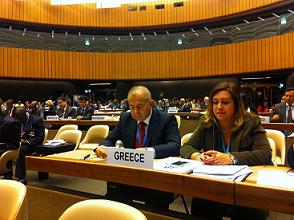
 News - Interviews - Speeches
News - Interviews - Speeches 64th Session of the Executive Committee of the High Commissioner’s Programme Statement by Greece
64th Session of the Executive Committee of the High Commissioner’s Programme Statement by Greece64th Session of the Executive Committee of the High Commissioner’s Programme Statement by Greece

General Debate- Ag. Item 4
Your Excellency, Mme Chair,
We fully align ourselves with the statement delivered by the European Union.
Greece faces a particularly strong migratory pressure. Today, there are 800,000 registered and an estimated 350,000 or more undocumented migrants in Greece. This is due to our geographical position which places us at the external border of the European Union, but also to Greece’s extensive land and maritime boundaries and its proximity with main countries of origin of migrants, whose economies are devastated by war and terrorism.
Mme Chair,
According to the 2012 Frontex Risk Analysis, the majority of the undocumented migrants detected while crossing or after having crossed the external borders of the EU, enter Greece through the Greek-Turkish frontier. Moreover, the current Syrian crisis affects further migratory trends and has a serious impact on EU external borders.
For these migrants Greece is a transit area or a stepping stone since they seek a better future in the economically more advanced countries of Europe.
As a result, a small country like Greece, facing an unprecedented economic hardship, is burdened with the vast majority of the irregular migrants in the whole of Europe.
Despite all these pressures, it should be noted that Syrian nationals are granted a special status in Greece, allowing them to obtain a renewable six-month residence permit on humanitarian grounds.
Non-legal migrants in Greece, also benefit from the revised Greek Action Plan on the Reform of the Asylum System and Migration Management, which constitutes the cornerstone of Greek government policy aiming to reform the asylum and immigration processes in a manner complying with international refugee and Human Rights norms.
In an effort to deal with migration trends the Action Plan provides for the following :
● An effective First Reception Service already in operation since March 2013
● A new independent Asylum Service
● An overall management of pending asylum cases, through forming a special task force charged with the processing of all the remaining appeals case files by the end of 2014.
● An improved and effective Returns policy, based on IOM Voluntary Repatriation Programmes with Reintegration Measures and on forced returns in implementation of Readmission Agreements with third countries.
● An effective Integrated Border Management, according to standard European models within the framework of the Schengen Acquis.
On the other hand, due to the impact of the crushing economic crisis, our success in overhauling the national system of refugee protection also depends on joint and coordinated efforts with our partners, such as the EU member states and the European Commission. A buffer zone of Europe, Greece carries a disproportionate burden, beyond its current capabilities, since responsibility for non-legal migrants - for purposes of repatriation, asylum etc - still primarily burdens the country of first entry, even though it handles a major percentage of migration flows towards the EU.
In this vein it should be stressed that the UNHCR has been instrumental in the recent reform of our asylum system and remains a vital source of support for the new services.
We strongly believe that international and regional cooperation, solidarity and burden sharing is the only way to ensure that refugees are afforded the protection and respect they deserve. With the alarming dimensions that migration influx and the ensuing humanitarian crisis are taking globally, the international community, under the guidance of the UNHCR and other partners, has to act collectively and in a coordinated manner in order to make the best use of the provisions of international refugee law and related mechanisms.
Thank you your Excellencies.









